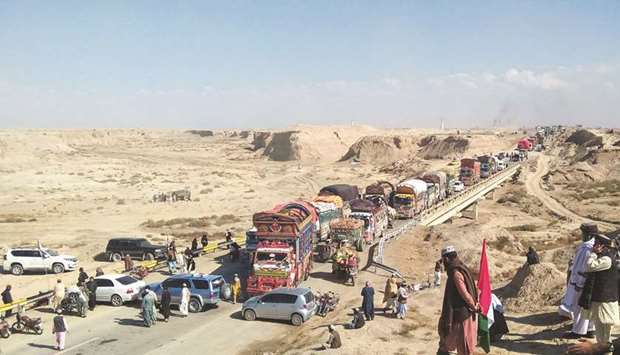Anti-government protesters in Pakistan called off a two-week sit-in on the capital’s main highway yesterday, but began what they called a “Plan B” aimed at crippling the country’s roads and ousting Prime Minister Imran Khan.
The protests, led by Fazl-ur-Rehman, head of the conservative Jamiat Ulema-i-Islam (F) party, began with the “Azadi” (freedom) March on October 27 from the southern city of Karachi.
Thousands of protesters reached the capital Islamabad on October 31, where they have been holding a sit-in demanding Khan’s resignation and a fresh election, over allegations of electoral fraud and mismanagement of the economy - accusations the government
denies.
Yesterday, Rehman told supporters, who waved distinctive sticks in the black-and-white stripes of the party, to return to their home states to begin “Plan B”.
“Our strength is converged here, and our associates are out on the roads, they need your help and assistance,” Rehman told the crowd from the top of an articulated lorry that has served as a stage for nightly
addresses to protesters.
“Your presence here has cut the roots of the government. In the next phase, we will
demolish this trunk.”
Earlier, JUI-F workers holding party flags blocked the western Quetta-Chaman highway linking the country with Afghanistan, resulting in a long queue of trucks laden with goods, footage from private news channels showed.
“The roads are already blocked with our workers but we are going to sit with them,” said Qutb-ud-Din, one of the many party supporters dismantling the makeshift tent camp in Islamabad. “We are going to begin Plan B.”
Rehman is a veteran politician who can mobilize significant support in religious circles across the country, especially in the southern and western states of Balochistan and Sindh.
If successful, the expansion of the sit-in could also disrupt Sindh’s capital Karachi, Pakistan’s most populous city and its commercial hub.
Rehman’s campaign is the first concerted opposition challenge that cricket star-turned-politician Khan has faced since he won a general election last year, promising to end corruption and create jobs for the poor.
The protests come as the government is battling high inflation and a sluggish economy.
Khan ran on a platform of economic reform, but his government - like many of its predecessors - was forced to turn to the International Monetary Fund (IMF) for a $6bn bailout in July.
The opposition says Khan’s government is illegitimate and is being propped up by the military, which has ruled Pakistan for about half of its history and sets security and foreign policy.
The military denies meddling in politics and Khan has dismissed the calls to step down.

Vehicles are seen after they were stopped on a highway linking the country’s southwest region with Afghanistan, during the second phase of so-called Azadi March (Freedom March), called by the JUI-F to protest against the government, in Qilla Abdullah near Quetta yesterday.
